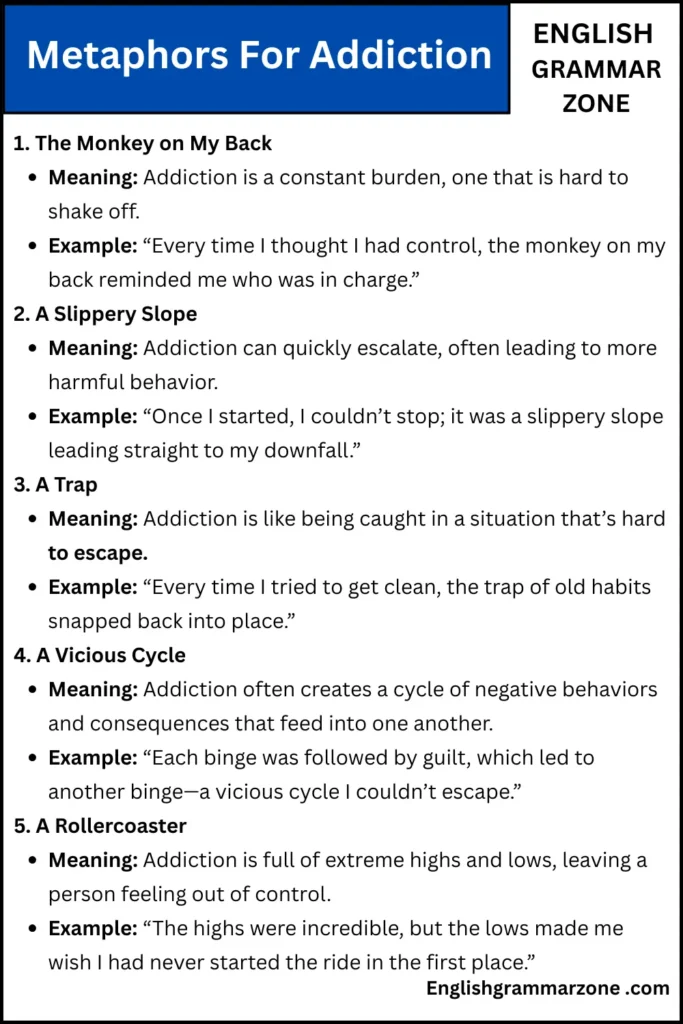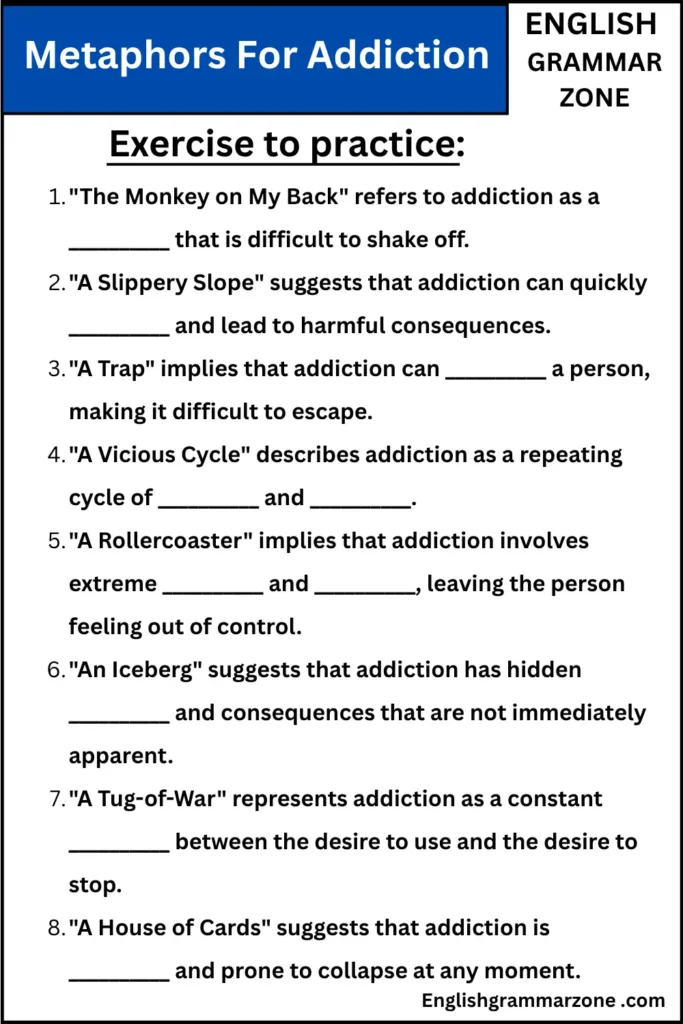Addiction is not just a physical condition; it is a multifaceted battle that affects individuals on emotional, psychological, and social levels. To truly understand addiction, we need to step into the shoes of someone who’s been through it. One of the most powerful tools for doing this is the use of metaphors for addiction, which help us describe and explain the abstract and often intangible experiences of addiction. In this article, we’ll explore various metaphors for addiction that can shed light on the complexity of this issue, from the emotional burdens to the psychological struggles.
What Are Metaphors?
Metaphors for addiction are figures of speech where one thing is described in terms of another. They allow us to express complex ideas more vividly and can evoke strong emotional responses. For addiction, metaphors for addiction offer insight into what it feels like to be trapped, controlled, or consumed by a substance or behavior. Each metaphor is a window into the experience of addiction, providing clarity for both the person suffering from addiction and those who are trying to understand it.
Key Definitions:
Metaphor: A figure of speech where something is described as though it were something else, often to illustrate a deeper meaning.
Addiction: A condition in which a person becomes dependent on a substance or activity, leading to harmful consequences in their life.
Psychological Impact: The emotional and mental toll that addiction can take, affecting thoughts, behaviors, and relationships.
Why Use Metaphors for Addiction?
Metaphors for addiction are not just poetic expressions. They serve as bridges between the abstract nature of addiction and the concrete understanding of others. Here’s why metaphors for addiction are so powerful:
Vivid Imagery: Metaphors for addiction paint a picture of addiction, making it easier for others to understand the complexity of the experience.
Emotional Connection: By using metaphors for addiction, we can tap into feelings and emotions that might otherwise be difficult to articulate.
Simplification: Metaphors for addiction break down complex concepts into digestible and relatable terms, making them accessible to a wider audience.
The following metaphors for addiction are not just common expressions—they are lived experiences of those who have fought against addiction, offering insight into its various dimensions.

Metaphors for Addiction: Exploring the Struggles
1. The Monkey on My Back
Meaning: Addiction is a constant burden, one that is hard to shake off.
Example: “Every time I thought I had control, the monkey on my back reminded me who was in charge.”
2. A Slippery Slope
Meaning: Addiction can quickly escalate, often leading to more harmful behavior.
Example: “Once I started, I couldn’t stop; it was a slippery slope leading straight to my downfall.”
3. A Trap
Meaning: Addiction is like being caught in a situation that’s hard to escape.
Example: “Every time I tried to get clean, the trap of old habits snapped back into place.”
4. A Vicious Cycle
Meaning: Addiction often creates a cycle of negative behaviors and consequences that feed into one another.
Example: “Each binge was followed by guilt, which led to another binge—a vicious cycle I couldn’t escape.”
5. A Rollercoaster
Meaning: Addiction is full of extreme highs and lows, leaving a person feeling out of control.
Example: “The highs were incredible, but the lows made me wish I had never started the ride in the first place.”
6. A Black Hole
Meaning: Addiction feels like an all-consuming force that pulls a person into its depths.
Example: “I felt like I was being pulled into a black hole, unable to escape its gravitational pull.”
7. An Iceberg
Meaning: Addiction can have hidden depths and unseen consequences that aren’t immediately obvious.
Example: “My addiction to alcohol was just the tip of the iceberg—underneath, there were years of emotional trauma.”
8. A Tug-of-War
Meaning: Addiction often involves an ongoing internal struggle between wanting to quit and the cravings to continue.
Example: “Every day was a tug-of-war between my desire for sobriety and the pull of the substance.”
9. A Maze
Meaning: Addiction feels like a confusing, overwhelming experience where finding a way out seems impossible.
Example: “I spent years running in circles, trapped in a maze of addiction and denial.”
10. A House of Cards
Meaning: Addiction can make a person’s life fragile, where everything can collapse at any moment.
Example: “My sobriety was like a house of cards—one wrong move and it would all come crashing down.”
11. A Wolf at the Door
Meaning: Addiction is a constant threat or danger, always lurking and ready to strike.
Example: “The urge to use drugs was the relentless ‘wolf at the door’ that haunted him daily.”
12. A Fire That Never Goes Out
Meaning: Addiction is an unquenchable craving, always burning inside the person, making it difficult to extinguish.
Example: “Despite years of sobriety, the craving for alcohol remained a ‘fire that never goes out’ within him.”
13. A Weight on My Shoulders
Meaning: Addiction is a heavy burden, a psychological load that one carries, affecting every aspect of life.
Example: “Carrying the secret of her addiction felt like a heavy ‘weight on her shoulders’ that she couldn’t share.”
14. A Disease
Meaning: Addiction is a health problem that requires treatment, just like any other disease, not a moral failing.
Example: “Recognizing addiction as a ‘disease’ helped shift the focus from blame to seeking help and treatment.”
15. A Bottomless Pit
Meaning: Addiction is an insatiable desire, a craving that can never be fully satisfied, no matter how much is consumed.
Example: “Her craving for opioids seemed like a ‘bottomless pit,’ no matter how many pills she took.”
16. A Puppet on a String
Meaning: Addiction makes a person feel controlled by an external force, as if they are being manipulated against their will.
Example: “The addiction to online gambling had turned him into a ‘puppet on a string,’ manipulated by the thrill of the game.”
17. A Leash
Meaning: Addiction is a form of constraint, something that keeps a person tethered to a harmful behavior or substance.
Example: “Breaking the ‘leash’ of addiction required immense willpower and a strong support system.”
18. A Double-Edged Sword
Meaning: Addiction can have both positive and negative effects, and what starts as pleasurable can eventually turn harmful.
Example: “For some, social drinking can be a ‘double-edged sword,’ providing relaxation while also leading to dependence.”
19. A Siren’s Call
Meaning: Addiction is seductive and tempting, luring individuals back into destructive habits with promises of pleasure or relief.
Example: “The enticing ‘siren’s call’ of the casino led him to gamble away his savings.”
20. A Poison
Meaning: Addiction is a toxic substance or behavior that slowly destroys one’s life and health.
Example: “Recognizing that alcohol was a ‘poison’ to his life was the first step towards recovery.”
21. A Thorn in My Side
Meaning: Addiction is a persistent problem, something that continuously causes irritation or pain and is hard to remove.
Example: “The craving for sugar was a persistent ‘thorn in her side’ as she tried to maintain a healthy diet.”
22. A Shadow
Meaning: Addiction follows a person everywhere, casting a dark influence over their thoughts, decisions, and actions.
Example: “Her history of addiction cast a long ‘shadow’ over her efforts to rebuild her life.”
23. A Demon
Meaning: Addiction is a powerful and destructive force, much like an internal demon that torments its victim.
Example: “He described his addiction to opioids as battling a relentless ‘demon’ that haunted his every moment.”
24. A Bottomless Well
Meaning: Addiction is a never-ending craving, one that drains a person of resources, energy, and hope, with no end in sight.
Example: “The addiction to shopping felt like pouring money into a ‘bottomless well’ with no end in sight.”
25. An All-Consuming Monster
Meaning: Addiction is a powerful, overwhelming force that consumes every aspect of a person’s life, leaving destruction in its wake.
Example: “His addiction to anger was an ‘all-consuming monster’ that strained his relationships and well-being.”
Exercise to Practice:

“The Monkey on My Back” refers to addiction as a __________ that is difficult to shake off.
“A Slippery Slope” suggests that addiction can quickly __________ and lead to harmful consequences.
“A Trap” implies that addiction can __________ a person, making it difficult to escape.
“A Vicious Cycle” describes addiction as a repeating cycle of __________ and __________.
“A Rollercoaster” implies that addiction involves extreme __________ and __________, leaving the person feeling out of control.
“An Iceberg” suggests that addiction has hidden __________ and consequences that are not immediately apparent.
“A Tug-of-War” represents addiction as a constant __________ between the desire to use and the desire to stop.
“A House of Cards” suggests that addiction is __________ and prone to collapse at any moment.
“A Wolf at the Door” suggests that addiction can feel like a constant __________ or __________.
“A Fire That Never Goes Out” describes addiction as an __________ craving that is hard to extinguish.
Answers
burden
escalate
ensnare
negative behaviors, consequences
highs, lows
depths
struggle
fragile
threat, danger
unquenchable
Conclusion
Addiction is a complex and deeply personal struggle that affects millions of people worldwide. Through the use of metaphors for addiction, we gain a clearer understanding of the various facets of this condition. Whether it’s the relentless grip of a “monkey on your back,” the confusing maze of “tug-of-war,” or the overwhelming nature of an “all-consuming monster,” these metaphors offer a way to relate to the emotional and psychological battle that addiction presents.
By exploring these metaphors, we not only shed light on the pain and frustration that addiction brings but also find a way to communicate the experience to others in a more accessible and empathetic way. Understanding addiction through metaphors provides a powerful tool for both individuals in recovery and their support systems. It fosters empathy, compassion, and a greater desire for healing and support.
As we continue to face the challenges of addiction, using metaphors can help to bridge the gap between those who struggle with addiction and those who aim to help. It’s a step towards breaking the silence, offering hope, and ultimately working together to fight the many battles that addiction presents.

